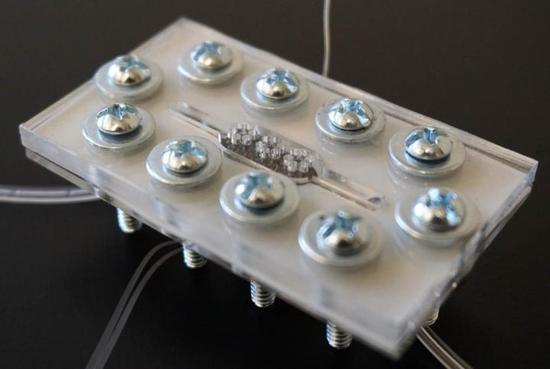A research team composed of researchers from Binghamton University and the State University of New York has developed a new type of biological solar cell. According to Seokheun Choi, the head of the research, the battery will be dedicated to powering the chips of medical diagnostic devices. Such diagnostic devices require an independent source of clean energy as an energy source, and miniaturized bio-based solar cells (abbreviated as micro-BSCs) are a very attractive option. Light and microbes in biological solar cells are the key to power generation, and the microbes can self-assemble and self-sustain.

Choi explained in a paper published in the “Labor Lab†magazine that the potential of bio-based solar cells has not yet been tapped because the micro-BSCs that have been created currently have current densities in nanowatts/cm2. The range cannot meet the needs of microfluidic devices and they can only last for several hours.
Choi's team designed a new structure for their solar cells and created a new bio-solar battery system that has a current output density that exceeds all current micro-BSC systems, with a maximum output of 43.8 microwatts/square. The centimeter, more notably its output during the day is 18.6 microwatts/cm2, the nighttime output is 11.3 microwatts/square centimeter, and can work continuously for about 20 days.
This kind of biological solar cell uses a kind of cyanobacteria, which is a single-celled plant that has survived the Earth for 2.5 billion years. This organism lives in fresh water. It can produce energy through photosynthesis during the day and at night through the degradation of glucose stored by biological enzymes. The cyanobacteria tend to grow into biofilms. They can spontaneously organize into groups. This biofilm is sometimes very annoying.
Choi's team cultivated this biofilm on carbon fiber cloth, and the conductive material applied to the fabric could act as an anode for solar cells. Choi and his students used a breathable and transparent silicone rubber film as a battery coat. The bio-solar cell they built is only 90 microliters and does not require any extra fuel.
Choi declared: "The advent of this bio-based solar cell will enable bio-energy conversion technology to break through the limitations of the concept of research, and the advancement of this technology means that it can not only be applied to the diagnostic equipment energy supply, but also in limited resources The environment or remote areas achieve independent work and self-sustainment."
Use stainless steel as the raw material that produces stainless steel trough, the way that passes an organic whole to stretch or weld undertakes the processing on the main body, undertake the product of model of form after surface treatment again, the installation that is used for ambry is indispensable a part, final finished product is used in contemporary kitchen as one of tool that washs dish or washs indispensable.Stainless steel water trough, the best feature of this tank is adaptable, every kind of decorate a style can be compatible, not afraid to be because even will sink in style also change, and is simple to install the water tank also, so that we may be short time can use, Stainless Steel Sink, wearability, to heat the kitchen also won't affect the normal use of it.
R15 Stainless Steel Kitchen Sink
Stainless Sink,Stainless Steel Double Sink,Stainless Steel Kitchen Sink,Stainless Steel Farm Sink
SUNRISE HOME GOODS(M)SDN.BHD. , https://www.sunrisesink.com